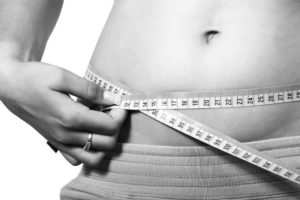Dietary Guidelines
Since the 1970’s, when the U.S. Government got involved in dietary guidelines, the focus for maintaining a healthy body weight became all about calories in vs. calories out and the avoidance of dietary fat, particularly saturated fats. Have you been keeping track of how well that has been going? Due to the nature of my profession, I have and I can tell you it hasn’t gone well. In fact, the United States has gone in the opposite direction and as I’m sure you’ve heard we are dealing with an obesity epidemic.
FYI, the first U.S. Dietary guidelines came out in 1977. Notice how that is right around when things really started to take off. Here are some other interactive graphs outlining the changes in the U.S. Obesity rate since 1960
It’s Hormones NOT Calories
 Here’s the thing that makes me a bit crazy. Despite the fact that the idea of reducing calories and/or increasing exercise (calories out) and avoiding fat in the diet has led to an obesity epidemic there isn’t a lot of discussion about changing the plan. It’s not calories that make us fat, it’s hormones, particularly insulin and cortisol. We, as a nation are suffering from wide-spread hormonal imbalance and it’s manifesting as something called metabolic syndrome: obesity, type 2 diabetes, high blood pressure, high cholesterol with crazy high triglyceride levels. If that’s not bad enough, there is a whole host of other degenerative diseases that are linked to the symptoms of metabolic syndrome.
Here’s the thing that makes me a bit crazy. Despite the fact that the idea of reducing calories and/or increasing exercise (calories out) and avoiding fat in the diet has led to an obesity epidemic there isn’t a lot of discussion about changing the plan. It’s not calories that make us fat, it’s hormones, particularly insulin and cortisol. We, as a nation are suffering from wide-spread hormonal imbalance and it’s manifesting as something called metabolic syndrome: obesity, type 2 diabetes, high blood pressure, high cholesterol with crazy high triglyceride levels. If that’s not bad enough, there is a whole host of other degenerative diseases that are linked to the symptoms of metabolic syndrome.
Now, something to think about. Obesity, type 2 diabetes, high blood pressure, high cholesterol and high triglyceride levels are all reversible. It’s true and I’m happy to say I’ve had the pleasure of working with some wonderful people who have done just that, reversed all of the above. When I say reversed, I mean having every blood marker for type 2 diabetes (being a type 2 diabetic) and then after dietary intervention having not one blood marker beyond what is considered a normal, healthy range. Not a hint of type 2 diabetes. This includes coming off blood pressure medicine, losing weight, bringing triglycerides down from the 600s to the low 100s all in 12 weeks. Pretty cool. Understand, this is not the end of their story, it’s the beginning. The long term goal is maintaining their newly regained health. This is where education about food and how it affects hormone signaling comes in.
Food is Information, Send the Right Message
I truly believe that with proper guidance and education about what food is and how it affects the body people will understand how to regain their health by actually understanding what to eat. That’s just the first piece, the second and probably the more important piece is understanding what not to eat. Knowledge about what food does in the body allows everyone to make educated decisions about what they’re going to eat and what they’re going to avoid.
Here’s a list of topics that I think need to be discussed in order to fully understand the current obesity epidemic and what to do about it:
- Insulin
- Cortisol
- Dietary Fat
- Sugar & artificial Sweeteners
- Processed/Refined Foods
- Body Set Weight
Each of the above topics is a pretty big discussion individually so I’m not going to dive in now. What I’d like to know is which of the above topics would you like me to explore first. Let me know by commenting below. I plan to post the next installment on Friday.
O.k., so I think I’ve given you some things to think about. In the next post I’ll dive into insulin, what it is, and how it’s involved in the obesity epidemic. Until then start thinking about what your typical diet contains. Is there a lot of sugar? What about fat? What kinds of fat do you eat, if you eat fat. How do you feel after you eat? Do you feel energized or tired? Do you have heartburn, gas or bloating? Are you constipated? These are all things you should know. Start thinking about how the food you eat makes you feel.
Eat well, feel good, have fun!
Part 2 – Body Weight Set-Point
Part 3 – Insulin, your Key to Weight Loss
part 4 – The Problem with High Fasting Insulin
Part 5 – Macronutrients and Weight Loss
Part 6 – Not Enough Fat, Too Many Carbs
Part 7 – It’s the type of Calories that Count

I’m Amy a board certified holistic nutritionist, certified functional nutritionist and lifestyle practitioner and certified Life Coach. I help women in midlife understand the changing needs of their body so that they can stop dieting and lose weight permanently. At 56 I live what I teach. Don’t believe the story that your best years are behind you. They are not. Your best years are just starting!

